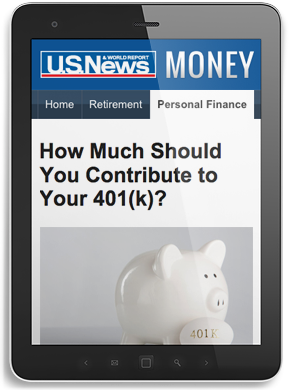What should you do with that 401(k) when you retire?

One thing not to forget when you leave a job: your 401(k)! Scott Puritz speaks to Rodney Brooks at The Washington Post about the best practice of taking your retirement savings with you when you switch jobs.
Big decisions loom for baby boomers. One of the biggest is what to do with the money they’ve socked away in their company-sponsored 401(k) plans.
Should you cut ties with your former company and move your money to an IRA? Or is it better to leave it where you are familiar with the options and comfortable with its safety?
Much is at stake. Boomers are retiring at a rate of 10,000 a day. In 2014, an estimated $325 billion was withdrawn from 401(k) plans as they retired. That’s projected to reach $500 billion in a few years, according to Cerulli & Associates, a Boston research firm.
Still, many haven’t thought much about what to do with the 401(k).
One choice is to do nothing. “Most employers will allow that money to stay there. They will just not be making new contributions,” says Paul Taghibagi, partner at Signature Estate & Investment Advisors.
“There are some pros and cons to doing that,” he says. “If you leave the money there, the assets are protected from claims from creditors. If you roll it over to an IRA, that is not necessarily the case.”
Taghibagi cites another reason to leave it: If you leave your job between 55 and 59½, there is no 10 percent withdrawal fee from your 401(k), as there would be with an IRA. And people are not required to take a minimum distribution after age 70½ if they are still working.
Marina Edwards, senior retirement consultant at Willis Towers Watson, says companies are starting to encourage employees to leave their 401(k)s unchanged when they go.
“It is a mutually beneficial arrangement,” she says. “The employees have access to low-cost mutual funds. The benefit for the employer is there are more 401(k) assets they can bargain for lower-cost investments.”
Don’t leave it, others say. “It’s your money, take it with you, dammit,” says Scott Puritz, Managing Director of Rebalance in Bethesda.
“We believe this is the best practice in this modern American economy, where job changing is the norm and where the average worker will have at least seven jobs during their career.
“As you are leaving your current employer, on that exit interview, on the last day, you should start the process of your 401(k) rollover,” he says. “The benefits are multiple: You have your money all in one spot. You have control, which is important from a psychological point of view. It allows you to lower your costs and get the appropriate level of asset allocation.”
Here are some other things to consider:
Retirement income flexibility. One big drawback to the 401(k) is the lack of flexibility when it comes to withdrawals. Most plans don’t allow regular distributions like, say, a pension or an annuity.
“I advocate that people have some level of guaranteed lifetime income and some money they can draw down,” says Steve Vernon, adviser with the Institutional Retirement Income Council.
“If you decide an annuity is a good idea, see if your 401(k) offers annuities. Right now, most of them don’t. So you would have to roll some of your money into an IRA.”
An income guarantee is a strong reason to transfer out of a 401(k), says Matthew Sadowsky, director of retirement and annuities at TD Ameritrade.
Market volatility, you have guaranteed growth,” he says. “If you are worried about outliving you income, you have guaranteed income,” he says. “Many 401(k)s don’t offer that guaranteed growth. If you are living off your 401(k), when they run out, they run out.”
“It doesn’t always have to be an all-or-nothing strategy,” says Catherine Golladay, vice president of 401(k) participant services at Charles Schwab. “Within the vast majority of 401(k) plans, you do have the ability when to retire to withdraw part of your funds and leave the rest invested in the 401(k).”
Fees. These vary widely, depending on the size of the company.
Puritz says his firm does a cost analysis for perspective clients. “With a small number of exceptions, we see fee structures of 2 to 3 percent a year. That’s astronomically high,” he says. “There is a misconception that the 401(k) is a great place. Large organizations do run efficient programs. But it’s a tale of two cities. In companies with 1,000 employees or less, the cost structure goes way up.”
More investment options. “In a 401(k) you only have so many options,” Sadowsky says.
“Those options have been determined by your plan. If you roll it over into an IRA, there are many choices.”
That gives you the opportunity to better hedge and diversify, he says.
Consolidation. Often people have several 401(k) accounts at past jobs. And IRA is an easy way to consolidate them.
Simplicity, familiarity and safety. There are other advantages to leaving your money in your company-sponsored 401(k).
“It is convenient and easy. They are familiar with the 401(k) plan and familiar with how it works,” Golladay says.





